Was there a good point made in the sermon you heard at the Mass you frequented in fulfillment of your Sunday obligation?
Let us know what it was!
For my part, I am not scheduled today! However, each year the seminarians of the diocese gather with the bishop for a week. Today, a couple of the newly ordained will join them for a Solemn Mass in the Extraordinary Form that they themselves organized! I’ve haven’t lifted a finger, though I will probably hoist my Liber Usualis and join the schola. It has been while, but I think I can still make out those squiggles.
UPDATE:
Here are some shots from the Solemn Mass the seminarians organized with the newly ordained. There were a few bumps along the way, but I am unspeakably proud of what they accomplished. Also, this was the first TLM ever for the 1 year ordained celebrant. A young priest ordained about 6 weeks was the MC and the deacons were ordained a couple months ago.
Again, they did this and I didn’t have much to do with it at all. They did it!
I also want to thanks the readers who have participated in the BIRETTAS FOR SEMINARIANS PROJECT. You can see the fruit of your generosity. NB: New year… new crop of seminarians. I’m just sayin’.
Some practice beforehand.
And so Mass begins. Cope because of the Asperges.
Getting ready for the Epistle.
Before the Gospel is announced.
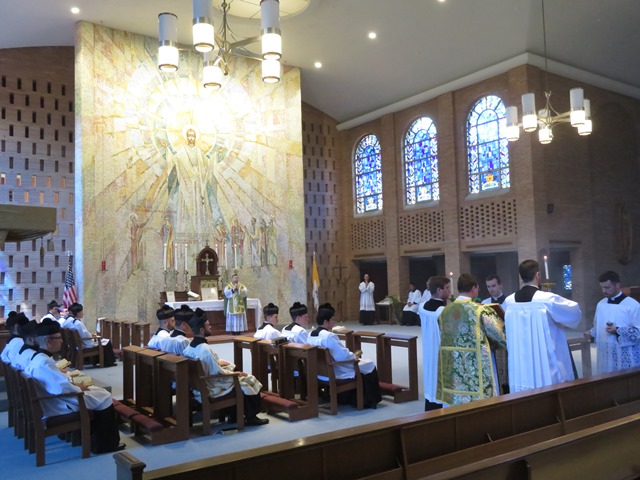
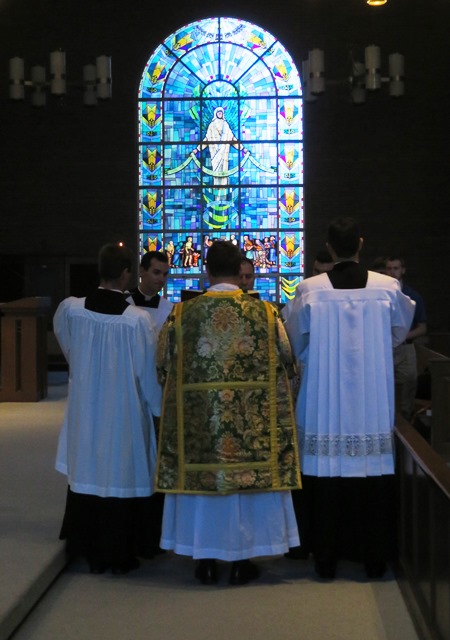
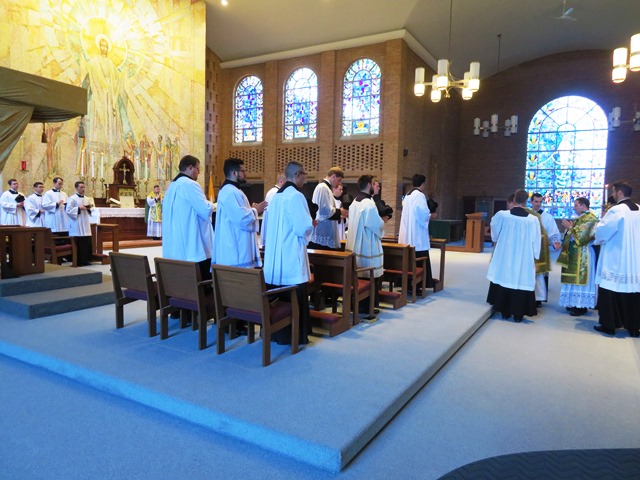
Consecration.
The Canon continues.
2nd Confiteor.
Anyway, that is a glimpse of how these seminarians had Sunday Mass.
¿Hagan lío?
We’ve gotchyer “lío” right here.
In a way… THIS was my Sunday sermon.
I’m tell you, this works.

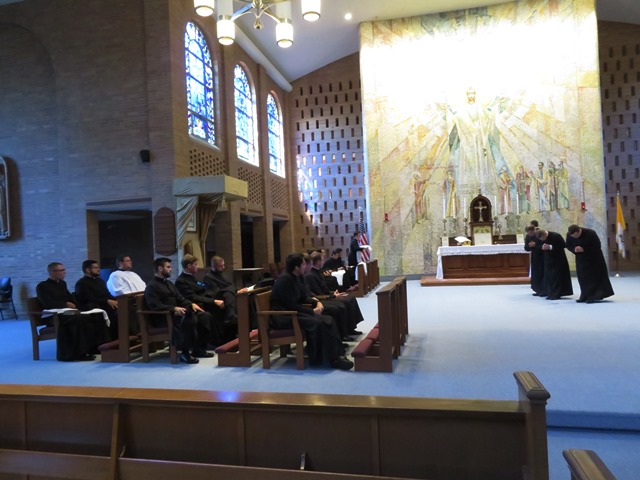
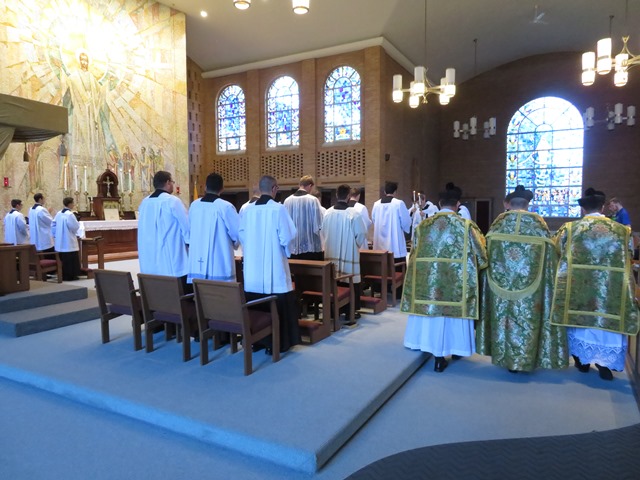
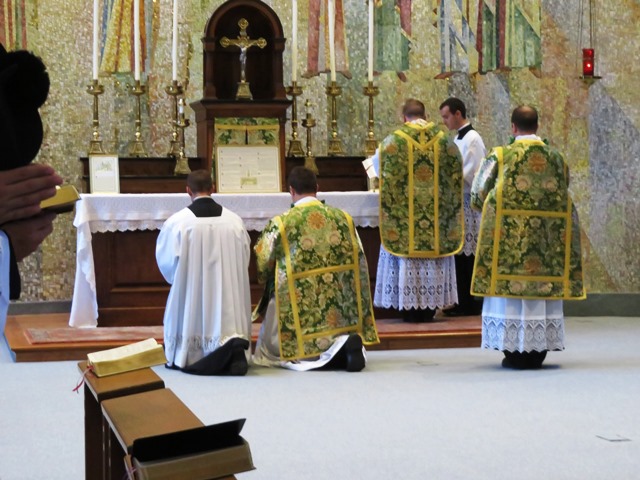
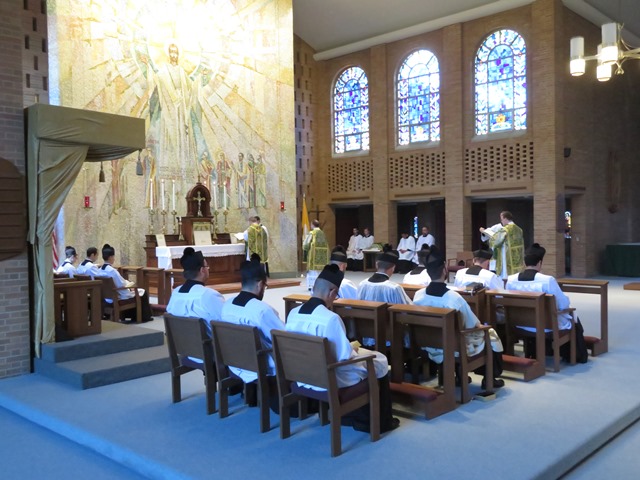
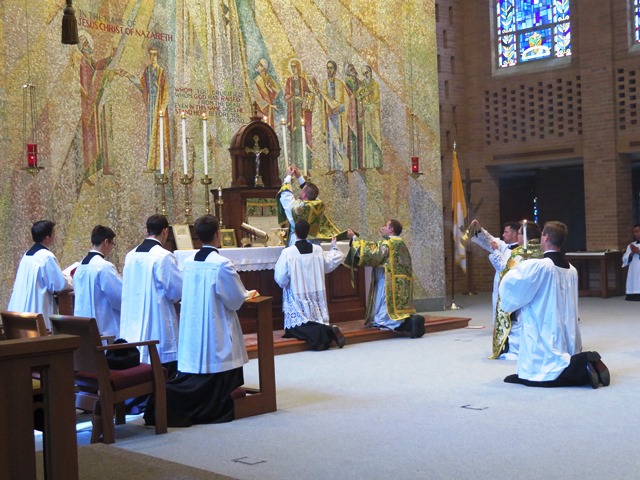

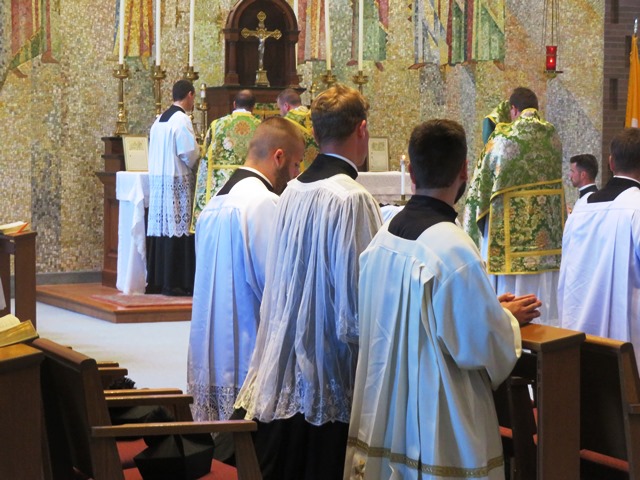
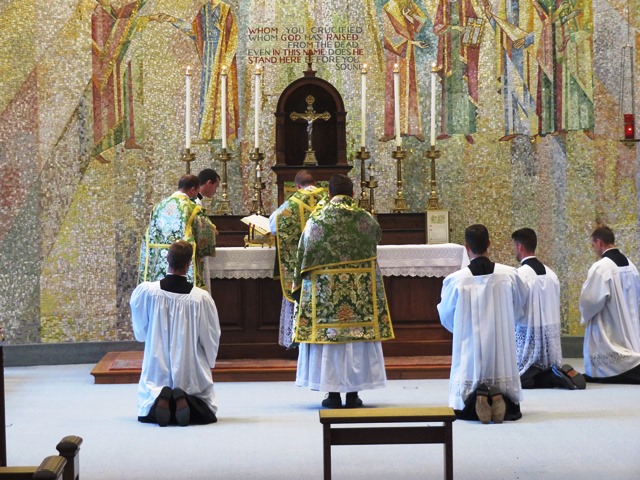
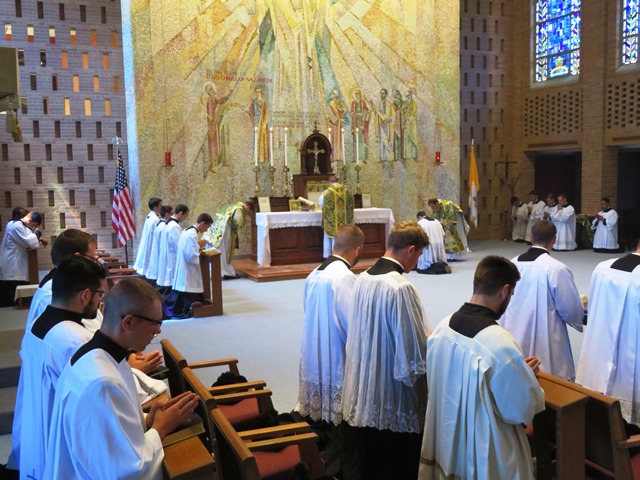

































Father spoke on economic justice. He said (He emails his sermons after Mass), “It is morally reprehensible when American mega companies undercut just wages and just hours for their employees overseas because it forces American companies to do the same at home to the domestic laborer. I call this financial adultery against one’s nation and fellow citizens. Let us transition to make a point…it is by the virtue of piety we are beholden towards our parents to love them. Because of this, we have an obligation to love our parents more than we love others even though we have an obligation to love everybody. By the same virtue of piety, we are obliged to love our country more than the other countries of the world and to strive for her self-sufficiency as a nation. We are to put our country first while not doing anything unjustly towards another country or her people.”
Believe it or not, Father spoke about the legitimacy of the death penalty. It is dogma, he said. He quoted the Catechism of the Council of Trent and the First Vatican Council. He said no one can change dogma. No Pope can change what has been taught as dogma for centuries.
Wait….
those don’t look like old men, reliving their childhood when everyone was in fancy dress -up.. Those seminarians are young men.
[on a more serious note]
I had the chance to attend the recent Institute ordinations in St. Louis (at St. Francis de Sales Oratory). As the procession passed me, I was struck by the cross-sectional nature of the congregation and the youth of the altar boys, seminarians and clerics. Here is the church of the near future.
Father spoke on the readings, with a tie-in to John Paul II’s 1985 visit to Peru – the hunger for bread, the hunger for God.
Keying off John 6, I talked about why non-Catholics and inactive Catholics must not receive Holy Communion at Mass. I explained it in reference to Christ as bridegroom, hence receiving the Eucharist is analogous to the marital act. I developed that analogy.
Father C, for the 19th Sunday of Ordinary Time, pointed out the irony of God becoming Incarnate, so as to be the channel for us to become part of Christ’s Mystical Body. However, as heard in today’s Gospel, Jesus’ physical, fleshly presence becomes a stumbling block to recognizing Him as God “come down from heaven”.
Wonderful sermon, Father Z!
Father D developed an interesting parallel: he asked an altar boy (only boys at our NO church) who was starting football practices at school: How many practices can you skip when you just feel like it? Is it OK if you show up late? Or leave early? Or don’t wear the uniform and wear any old clothes? Answers: no, of course not – coach won’t put up with that nonsense. Well, the same goes for showing up at church for Mass: you can’t skip Mass when you feel like it, you’re expected to be there on time and stay all the way through, and to wear the appropriate clothing. Etc.
Not the greatest sermon of all time, but the analogy definitely hit home with people.
Father blew me away this past Sunday, the 12th after Pentecost. The sermon was about Sanctifying Grace. which Father framed in a historical/geographical context. The observation was made that Jerusalem, both physical and spiritual sits on a hill while Jericho rests below sea level, i.e. in the depths. Jericho was also the city that resisted the Israelites when they were entering the Promised Land. Therefore, God destroyed it since His will was being thwarted. Given this historical context, Our Lord used these two cities in his parable to represent a continuum since they represent moral extremes, and the man who was robbed, was traveling to Jericho. I.e. leaving the path of Grace so to speak eventually gets you in trouble. Needless to say, traveling in this direction leads to problems represented by the robbery and resulting half dead victim. The priest and Levite represented individuals who one comes across a victim, who will look in his direction but will not help. It could be that they might even be willing, but do not have the means by which they can help this victim in this particular case. The Good Samaritan on the other hand, is in a position to provide the victim with not only the immediate first aid, but can also take care of the victims secondary needs, like transporting him to the inn and paying the innkeeper to attend to the victim until he convalesces. The goal of the help is in order to make the victim able to function once again. The unsaid reasoning behind why the Good Samaritan intervened was to provide everything that the victim needed to allow him to return to the starting point of his journey, i.e. the city on the hill. Jerusalem.
At our “home away from home” parish, Father spoke about John 6 as the basis for our belief in the Real Presence and how we need to believe that Jesus is truly present body blood soul and divinity. He also noted the need to be in a state of grace and the availability of confession before every weekend Mass (!).
The mention of confession before Mass was one of the small but encouraging changes I see in this parish since the new priest came on board, after many years with a liberal priest followed by a period of turmoil with various fill-ins and temporary administrators. Another good sign – a vested chalice, probably the first time that has been done here in 50 years.
OF – I talked about how many people are without hope like Elijah. The work of the angels in the Holy Mass, and how they lead us to hope, and intercede for us to be open to the graces that come from the heavenly food in the Eucharist.
EF – Based my sermon on the Introit. “Deus, in adjutórium…” is the prayer of every Christian. It’s a recognition of our dependence on God. We are intercessors first to deepen our personal communion with God and for others who are lost, that they recognize their need for God. Our Lord is the Good Samaritan who picked us up off the curb we were thrown to by Adams fall. He reminds of our dependence on him as we “Look at the birds of the air” and how He “feeds them.”
Fr, the parish priest, used the Gospel’s parable of the Good Samaritan on how the root of charitable conduct is a true love of self. It is not eating, drinking, impurity, sating an appetite, but rather a day started with prayer, duties done well, and concluded with prayer and reflection on one’s conduct. This is a foundation for charitable conduct, living as the Good Samaritan.
Also superb photos, and forgot ‘love of the the Image of God in self.’
Father talked about the value of suffering.
Epiousios, and how that fits in with manna.
Seriously. Not lying. That was in the homily.
It is amazing how the young priests get more conservative every year.
A local parish had long requested the TLM, and since the beginning of the year it has been said once a month on the second Sunday, on a trial basis. Attendance was high enough that the Mass has been made permanent; this Sunday Father held up a Roman Missal and advised everyone to get one so that they could better unite themselves in prayer, and said “this Mass is here to stay, not only here at this parish, but all over the world in the all the Church.”